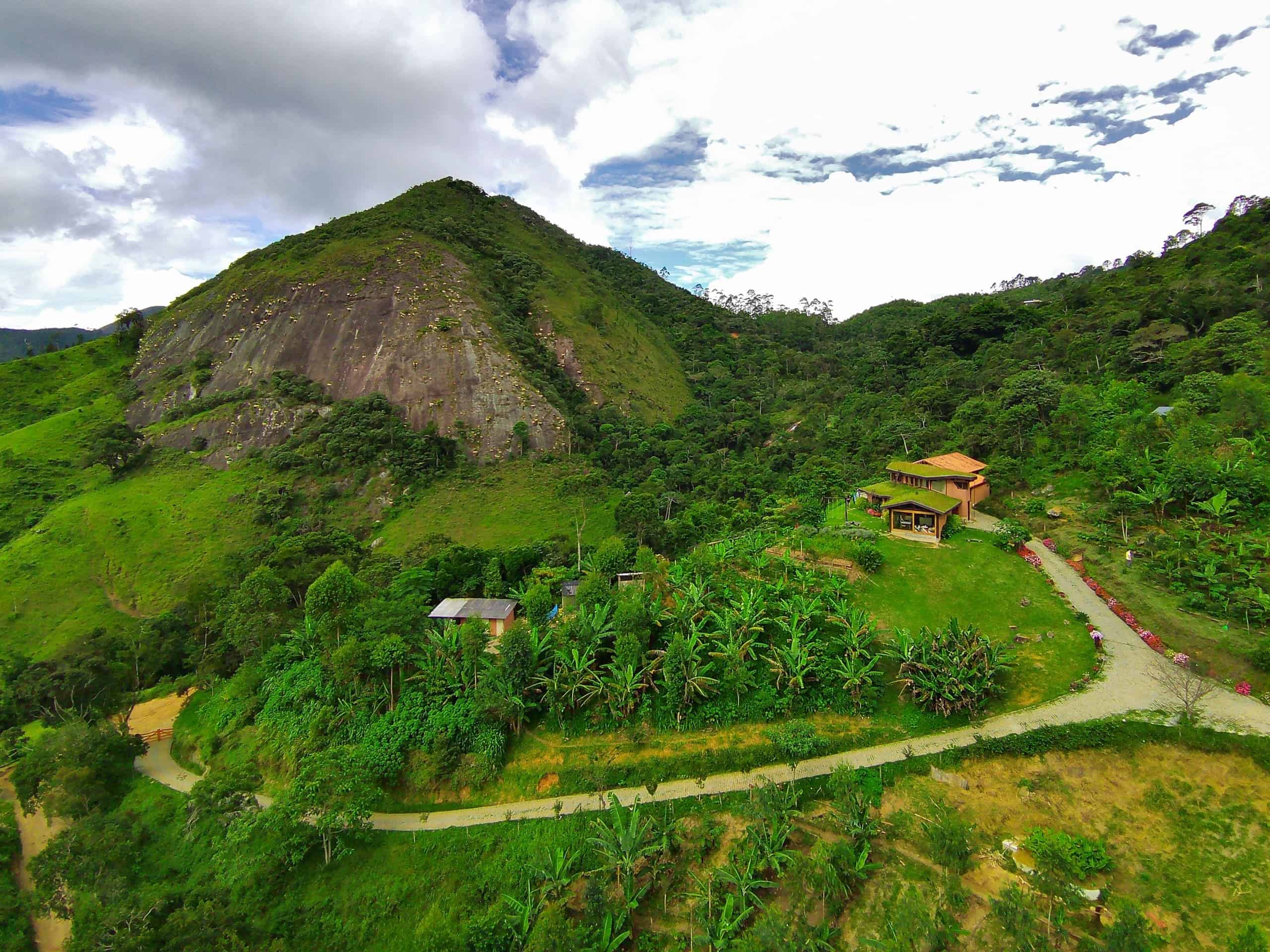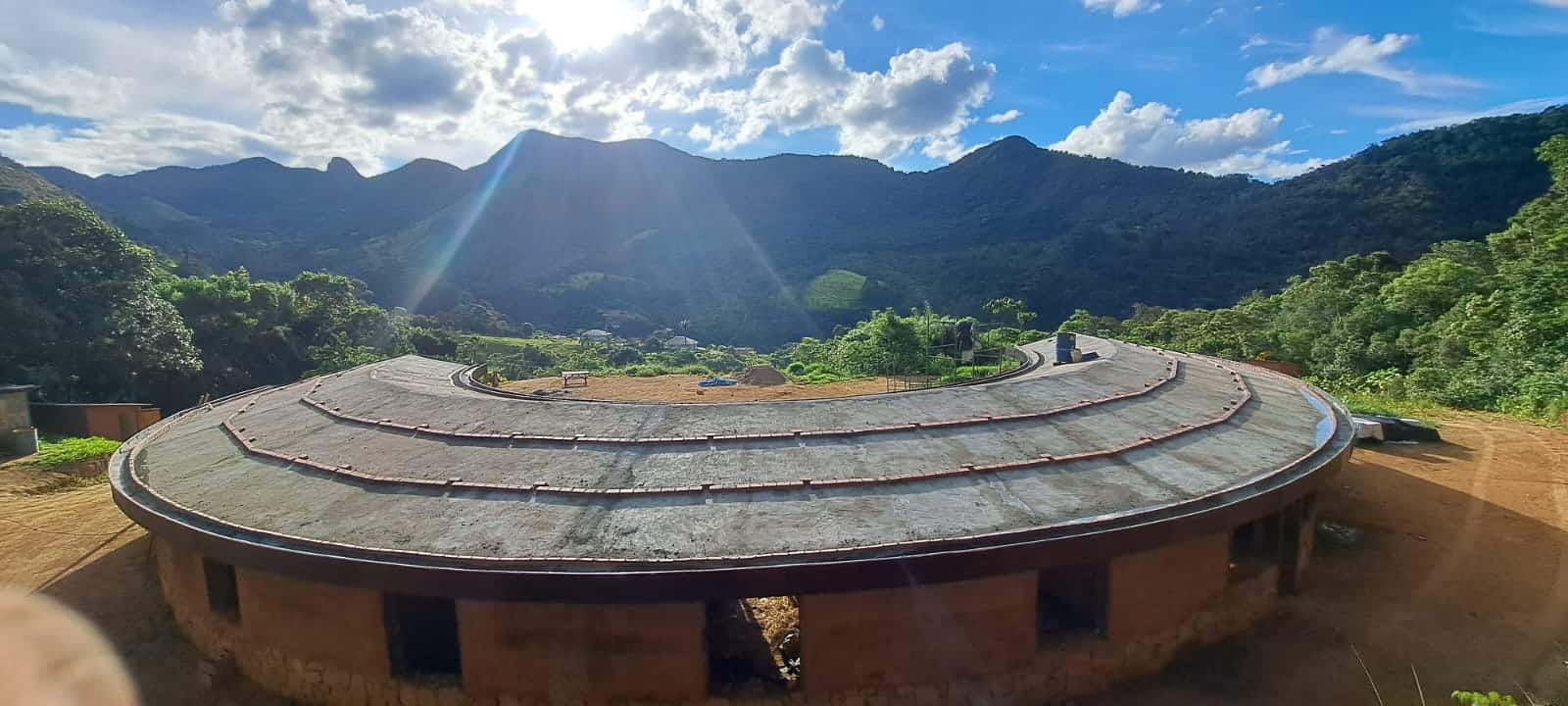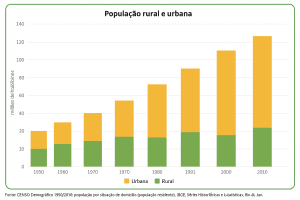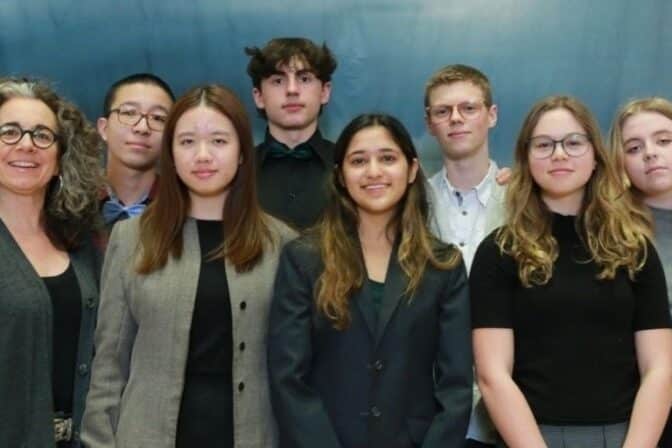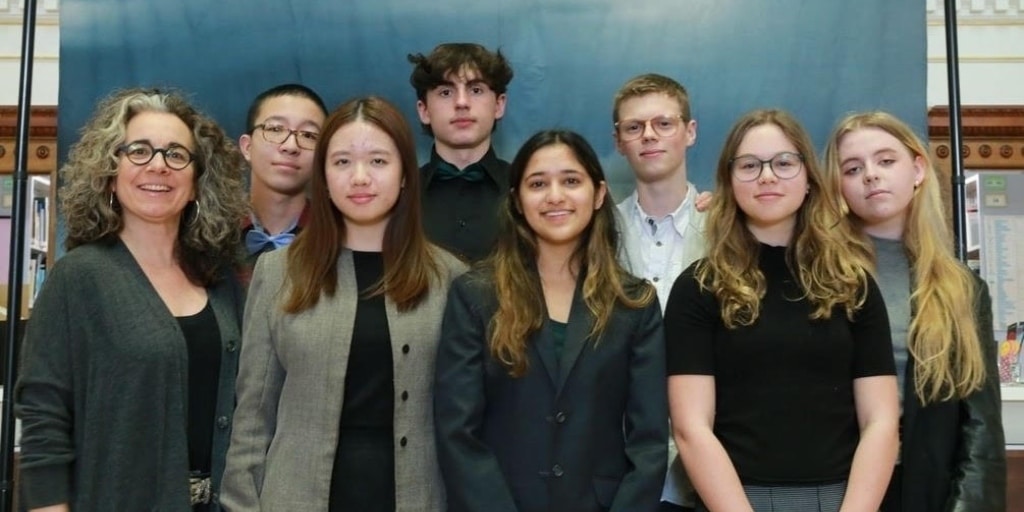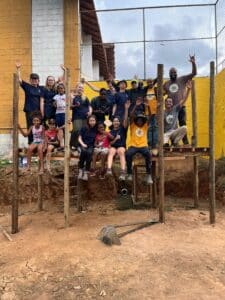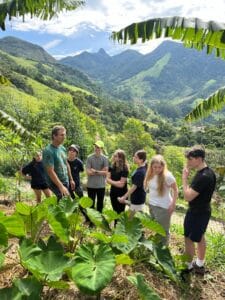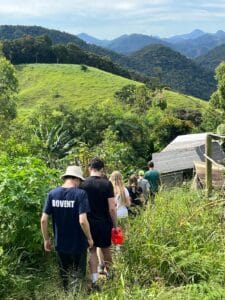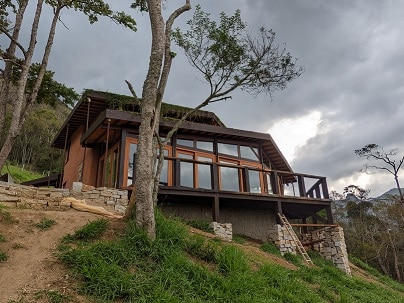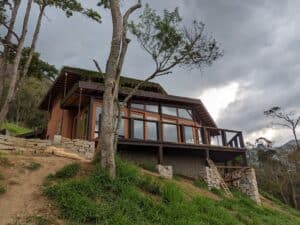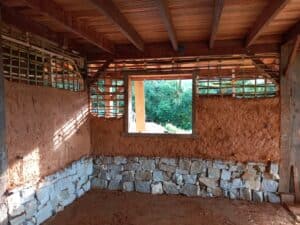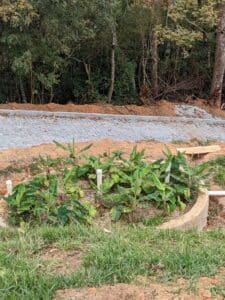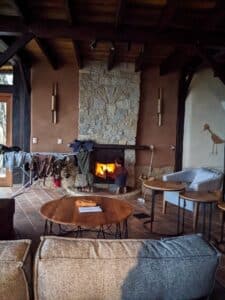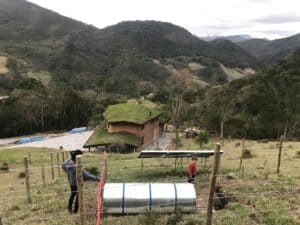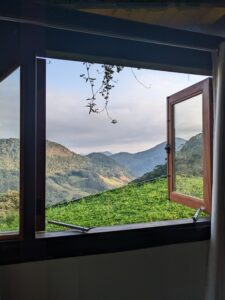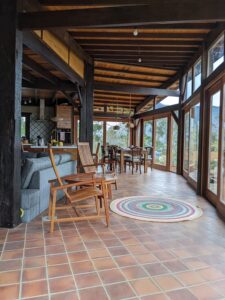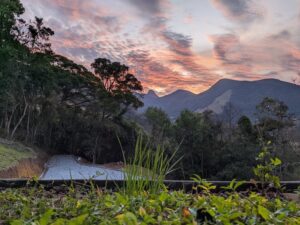[vc_row css=”.vc_custom_1739379399395{margin-right: 30px !important;margin-left: 30px !important;}”][vc_column][gap size=”30px” id=”” class=”” style=””][/vc_column][/vc_row][vc_row css=”.vc_custom_1740408802641{margin-right: 30px !important;margin-left: 30px !important;}”][vc_column width=”1/2″][swmsc_text_block id=”” class=”” style=””]Será que é possível conectar Agrofloresta, Educação Ambiental, Voluntariado e Esporte de Aventura ? Leia esse artigo e descubra se sim!
O mês de maio nos convida a olhar com mais atenção para um dos maiores tesouros naturais do Brasil: a Mata Atlântica. No dia 27 de maio, celebramos o Dia Nacional da Mata Atlântica, essa data é mais do que uma homenagem — é um chamado à consciência e à ação coletiva para a preservação e regeneração da natureza que ainda resiste em meio às montanhas do sudeste brasileiro.
E se tem um lugar onde esse chamado é levado a sério, é na Eco Caminhos, nossa ecofazenda localizada na região serrana do Rio, em Nova Friburgo.
🌿 Uma floresta viva que pede cuidado
A Mata Atlântica abriga cerca de 72% da população brasileira e já perdeu mais de 85% de sua vegetação original. Mesmo assim, continua sendo um dos biomas mais biodiversos do mundo, com espécies únicas de fauna e flora. A região de Nova Friburgo faz parte desse ecossistema e, por isso, exige atenção especial.
Preservar o que sobrou e restaurar o que foi destruído exige ação prática, educação ecológica e um novo olhar para a forma como produzimos, consumimos e vivemos. Aqui na Eco Caminhos, praticamos a regeneração ambiental ativa, com sistemas agroflorestais que imitam o funcionamento natural da floresta, a bioconstrução com materiais ecológicos e locais, e a permacultura como filosofia e prática de vida.[/swmsc_text_block][gap size=”30px” id=”” class=”” style=””][/vc_column][vc_column width=”1/2″][swmsc_image_gallery border_radius=”0″ border_width=”0″ border_color=”#e6e6e6″ image_margin=”40px” image_size=”full” columns=”1″ grid_type=”masonry” image_text=”none” hover_icon_color=”#ffffff” hover_icon_bg_color=”#f8b54e” title_text_size=”20px” title_text_color=”#555555″ caption_text_size=”16px” caption_text_color=”#777777″ caption_border=”off” id=”” class=”” style=”” image_ids=”27339,27340″][/vc_column][/vc_row][vc_row css=”.vc_custom_1739379399395{margin-right: 30px !important;margin-left: 30px !important;}”][vc_column][swmsc_image_gallery border_radius=”5px” border_width=”0″ border_color=”#e6e6e6″ image_margin=”20px” image_size=”full” columns=”3″ grid_type=”none” image_text=”none” hover_icon_color=”#ffffff” hover_icon_bg_color=”#f8b54e” title_text_size=”20px” title_text_color=”#555555″ caption_text_size=”16px” caption_text_color=”#777777″ caption_border=”off” id=”” class=”” style=””][gap size=”30px” id=”” class=”” style=””][swmsc_text_block id=”” class=”” style=””]🌱 Eco Caminhos: regeneração ambiental e transformação social
Cuidar da Mata Atlântica não é uma campanha — é a nossa rotina. Em nossa fazenda, não apenas admiramos a Mata Atlântica — nós trabalhamos diariamente para regenerá-la.
Somos uma ecofazenda fundada sobre os princípios da permacultura, localizada em meio às montanhas de Nova Friburgo. Aqui, vivemos e promovemos uma abordagem integrada de sustentabilidade, que inclui:
- 🌳 Agroflorestas: sistemas de cultivo que imitam o comportamento natural da floresta, unindo produção de alimentos com regeneração do solo e da biodiversidade.
Quer saber mais sobre Agrofloresta? https://zieplay.com/br/agrofloresta-agricultura-sintropica/
- 🛖 Bioconstrução: técnicas ecológicas e de baixo impacto para criar moradias funcionais, confortáveis e harmonizadas com o ambiente.
Conheça os nossos projetos de Bioconstrução: https://zieplay.com/br/bioconstrucao-construcao-sustentavel-brasil/
- 🤝 Integração comunitária e voluntariado internacional: recebemos pessoas do mundo todo para vivenciar, aprender e multiplicar esse conhecimento.
- Para conhecer nossas oportunidades de voluntariados, visite: https://zieplay.com/br/oportunidades-de-voluntariado/
Nosso trabalho vai além da terra: impactamos positivamente a comunidade local, promovendo inclusão social, educação ambiental e oferecendo oportunidades para jovens e adultos se reconectarem com o meio ambiente de forma prática e transformadora.[/swmsc_text_block][swmsc_image_gallery border_radius=”0px” border_width=”0″ border_color=”#e6e6e6″ image_margin=”20px” image_size=”full” columns=”2″ grid_type=”masonry” image_text=”none” hover_icon_color=”#ffffff” hover_icon_bg_color=”#f8b54e” title_text_size=”20px” title_text_color=”#555555″ caption_text_size=”16px” caption_text_color=”#777777″ caption_border=”off” id=”” class=”” style=”” image_ids=”27341,27343,27344,26962″][gap size=”30px” id=”” class=”” style=””][/vc_column][/vc_row][vc_row css=”.vc_custom_1739379399395{margin-right: 30px !important;margin-left: 30px !important;}”][vc_column][swmsc_image_gallery border_radius=”5px” border_width=”0″ border_color=”#e6e6e6″ image_margin=”20px” image_size=”full” columns=”3″ grid_type=”none” image_text=”none” hover_icon_color=”#ffffff” hover_icon_bg_color=”#f8b54e” title_text_size=”20px” title_text_color=”#555555″ caption_text_size=”16px” caption_text_color=”#777777″ caption_border=”off” id=”” class=”” style=””][gap size=”30px” id=”” class=”” style=””][swmsc_text_block id=”” class=”” style=””]🏔️ Free Mountain Festival: esporte, cultura e natureza em harmonia
Este ano, o Free Mountain Festival trouxe ainda mais significado ao mês de maio. O evento, que ocorreu no Espaço ARP e nas montanhas de Nova Friburgo, celebra a vida ao ar livre e a cultura de montanha, com atividades como trekking, escalada, trail run, além de palestras ambientais, exposições culturais e cinema ao ar livre.
Mais do que um evento esportivo, o Free Mountain Festival mostrou que é possível unir aventura, arte, cultura e responsabilidade ambiental — criando experiências que encantam e conscientizam ao mesmo tempo.
A Eco Caminhos acredita profundamente nesse tipo de iniciativa. Ver tantas pessoas se conectando com a natureza e trocando saberes sobre meio ambiente reforça nossa certeza de que a mudança já está em curso — e pode ganhar cada vez mais força com união e propósito.
Confira o site do evento: https://freemountain.com.br/[/swmsc_text_block][swmsc_image_gallery border_radius=”0px” border_width=”0″ border_color=”#e6e6e6″ image_margin=”20px” image_size=”full” columns=”2″ grid_type=”masonry” image_text=”none” hover_icon_color=”#ffffff” hover_icon_bg_color=”#f8b54e” title_text_size=”20px” title_text_color=”#555555″ caption_text_size=”16px” caption_text_color=”#777777″ caption_border=”off” id=”” class=”” style=”” image_ids=”27345,27346″][gap size=”30px” id=”” class=”” style=””][/vc_column][/vc_row][vc_row css=”.vc_custom_1740408854358{margin-right: 30px !important;margin-left: 30px !important;}”][vc_column width=”1/2″ css=”.vc_custom_1740579636539{margin-right: 100px !important;padding-right: 50px !important;}”][gap size=”30px” id=”” class=”” style=””][gap size=”30px” id=”” class=”” style=””][swmsc_image link=”#” lightbox=”true” target=”_self” lightbox_type=”image” align=”left” alt=”” title=”” border_radius=”0px” id=”” class=”” style=”” src=”27342″][/vc_column][vc_column width=”1/2″][gap size=”30px” id=”” class=”” style=””][swmsc_text_block id=”” class=”” style=””]🌍 Sustentabilidade na prática: nosso papel local e global
A Eco Caminhos é um espaço de transformação ecológica e social. Recebemos voluntários, aprendizes e turistas do mundo todo que vêm para aprender, ensinar e viver uma nova forma de se relacionar com a terra. Ao regenerar o solo, ao plantar árvores, ao construir casas com barro e ao viver em comunidade, estamos escrevendo uma nova narrativa para o planeta — e ela começa aqui, na Mata Atlântica.
Acreditamos que a preservação não se faz sozinha. É preciso parcerias, eventos, educação e presença ativa da comunidade. Por isso, celebramos cada movimento que valoriza a nossa serra, nossa floresta e nossa cultura de montanha.[/swmsc_text_block][/vc_column][/vc_row][vc_row css=”.vc_custom_1731520578623{margin-right: 20px !important;margin-left: 20px !important;}”][vc_column][gap size=”30px” id=”” class=”” style=””][swmsc_text_block id=”” class=”” style=””]🤝 O futuro depende das nossas escolhas
A Mata Atlântica precisa de mais do que proteção: ela precisa de pessoas engajadas, conectadas e dispostas a mudar a forma como vivem. É isso que buscamos na Eco Caminhos. E é por isso que cada visita, cada festival, cada voluntário e cada árvore plantada importa.
Se você acredita nesse caminho, venha nos conhecer. Participe como voluntário, aprendiz ou visitante. Ajude a regenerar a floresta e a construir um futuro mais justo, sustentável e conectado à natureza.
🌐 www.zieplay.com[/swmsc_text_block][vc_single_image image=”27074″ img_size=”large” css=””][/vc_column][/vc_row]
